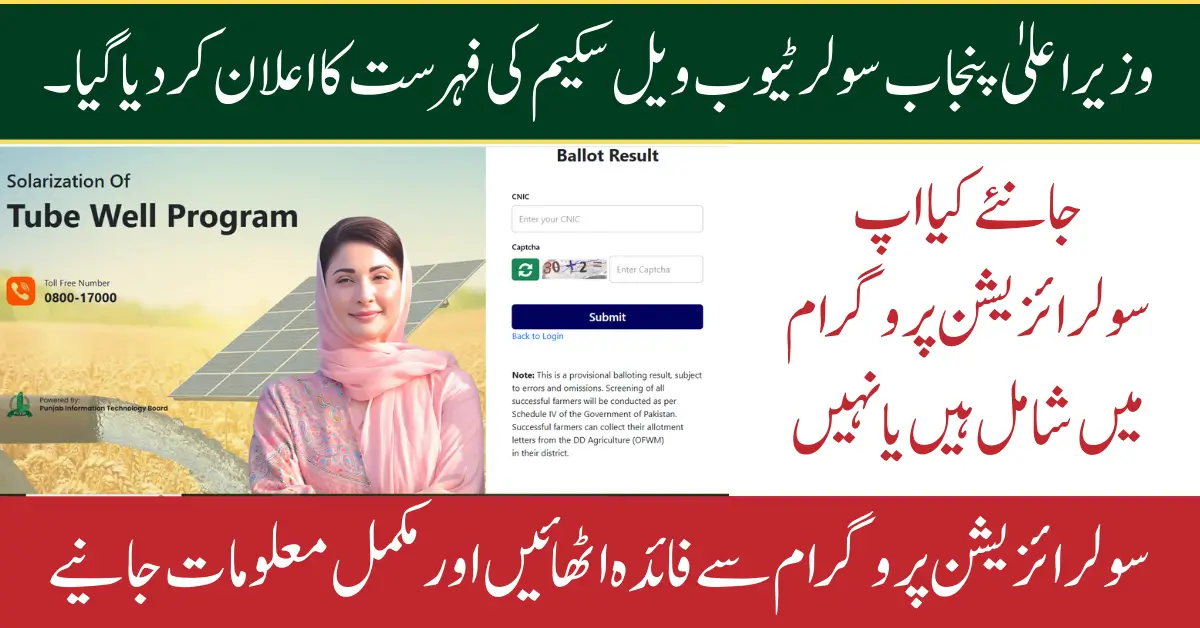CM Punjab Solar Tubewell Scheme List
CM Punjab Solar Tubewell Scheme List Punjab government has launched a game-changing initiative for farmers in the region, designed to transform agriculture by reducing energy costs and promoting sustainable farming practices. The CM Punjab Solar Tubewell Scheme is a significant step towards integrating renewable energy into farming, and the latest update is the announcement of the 2025 Balloting Results. In this article, we’ll walk you through the details of the program, how the balloting works, and what the selected farmers need to know to make the most of this opportunity.
You Can Also Read: BISP 13500 Payment What to Do if You Don’t Get Response
The CM Punjab Solar Tubewell Scheme aims to modernize agriculture by shifting farmers from traditional, expensive energy sources like diesel and electricity to solar-powered irrigation systems. This initiative is part of Punjab’s broader vision to increase sustainability in farming and reduce the financial burden on farmers who rely heavily on tube wells for irrigation.

The scheme offers solar panels to farmers for the installation on their tube wells, allowing them to harness solar energy to power their irrigation systems. By using sunlight a free and abundant resource farmers can drastically cut down on fuel costs and electricity bills. Solar energy is not only cost-effective but also reliable, especially during the frequent power outages in rural areas, ensuring uninterrupted irrigation throughout the farming season.
2025 Balloting Results A Big Milestone
On January 31, 2025, the first phase of balloting for the CM Punjab Solar Tubewell Scheme was conducted, and the results are in! A total of 8,000 farmers from across the province were selected for the installation of solar panels at their tube wells. The balloting process was held publicly and transparently, with every eligible farmer given a fair chance to be selected.
You Can Also Read: BISP 8171 Payment Status Check Online 13500 In 2025 Using Portal
However, it’s important to note that the results are provisional, meaning they’re subject to further validation. Farmers who were selected in the balloting will need to go through a screening process as per government regulations to confirm their eligibility. This process ensures that all applicants meet the criteria laid out by the Punjab government.
Once the screening is complete, successful candidates will be able to collect their official allotment letters from the District Director of Agriculture OFWM in their respective districts. These letters will confirm their participation in the program and guide them on the next steps.
How Does the Balloting Process Work?
The balloting was a highly anticipated event among farmers, as the program offers significant cost savings and environmental benefits. Here’s how the process works:
- Public and Transparent: The balloting event was conducted in a public setting, ensuring complete transparency. Every farmer had an equal chance of being selected, with no favoritism involved.
- Provisional Results: The results announced on January 31st are provisional. This means the names drawn in the ballot are subject to verification and review. There may be some errors or omissions, which will be resolved through the screening process.
- Screening Process: All selected farmers will go through a screening process as per Schedule IV of the Government of Pakistan’s regulations. This process will ensure that only eligible candidates receive the benefits of the program. It involves verifying information, checking eligibility, and ensuring compliance with the program’s guidelines.
- Official Allotment Letters: After successful screening, farmers will receive official allotment letters from the District Director of Agriculture (OFWM), confirming their participation in the program.
You Can Also Read: Benazir Kafaalat Rejection Renewal Process Documents
Benefits of the CM Punjab Solar Tubewell Scheme for Farmers
The solarization of tube wells brings multiple benefits for farmers, both economically and environmentally. Here’s how the program can make a big difference:
1. Cost Savings
By installing solar panels on tube wells, farmers can significantly reduce their monthly energy costs. Traditional energy sources, such as diesel and grid electricity, are not only expensive but also unreliable. Solar energy, on the other hand, is free and abundant, which means farmers can irrigate their fields without worrying about high bills or power outages.
2. Reliable Irrigation
With solar-powered tube wells, farmers no longer have to depend on erratic electricity supply or expensive fuel. Solar energy ensures that tube wells can operate during the day and night, providing a consistent and reliable water supply. This is especially crucial during dry spells or power outages when irrigation systems often fail.
3. Environmental Impact
The solarization of tube wells is a step towards reducing the carbon footprint of agriculture. Solar energy is clean, renewable, and environmentally friendly. By switching to solar power, farmers contribute to reducing greenhouse gas emissions and promote sustainable farming practices.
4. Improved Crop Yields
With consistent irrigation powered by solar energy, farmers can expect better crop yields. The ability to water crops efficiently and on time leads to healthier plants and more stable production. This can directly contribute to increased profits and improved food security in the region.
You Can Also Read: Kpk Solar Panel Scheme Registration 130000 Families Will Be Able To Benefit
What’s Next for Selected Farmers?
If you were lucky enough to be selected in the balloting, here’s what you need to do next:
1. Collect Your Allotment Letter
After the screening process, successful candidates will be informed through the official allotment letter. Farmers must collect this letter from the District Director of Agriculture (OFWM) in their respective districts.
2. Site Inspections and Technical Assessments
Once you have the allotment letter, the next step involves site inspections and technical assessments. Experts will visit your farm to assess the location of the tube well and determine the most efficient way to install the solar panels.
3. Installation of Solar Panels
After the assessments, the solar panels will be installed at your farm. Installation will be carried out by certified teams, and the solar system will be set up to power your tube well efficiently.
4. Training and Support
Farmers will receive training on how to operate and maintain the solar-powered system. This will help you maximize the benefits of the solarization process and ensure that your tube well runs smoothly.
What If You Didn’t Get Selected?
If you weren’t selected in this round of balloting, don’t lose hope! The CM Punjab Solar Tubewell Scheme is set to expand in future phases. The government plans to continue rolling out the program to include more farmers in the coming months and years.
You Can Also Read: KPK Solar Panel Scheme Online Registration Deadline Extended
To increase your chances of being selected in the next phase, make sure your registration details are up to date and stay informed about the upcoming balloting dates. The program is designed to reach as many farmers as possible, so there will be more opportunities to benefit from solar energy in the future.
Conclusion
The CM Punjab Solar Tubewell Scheme marks a major leap towards modernizing agriculture in the province. By making solar energy accessible to farmers, the program promises to reduce energy costs, improve irrigation systems, and contribute to environmental sustainability.
For the 8,000 farmers selected in this phase, the program is a game-changer that will help improve agricultural efficiency and reduce reliance on expensive non-renewable energy sources. As the program expands, it’s expected that even more farmers will benefit from this initiative, creating a ripple effect that will positively impact Punjab’s agricultural landscape.
